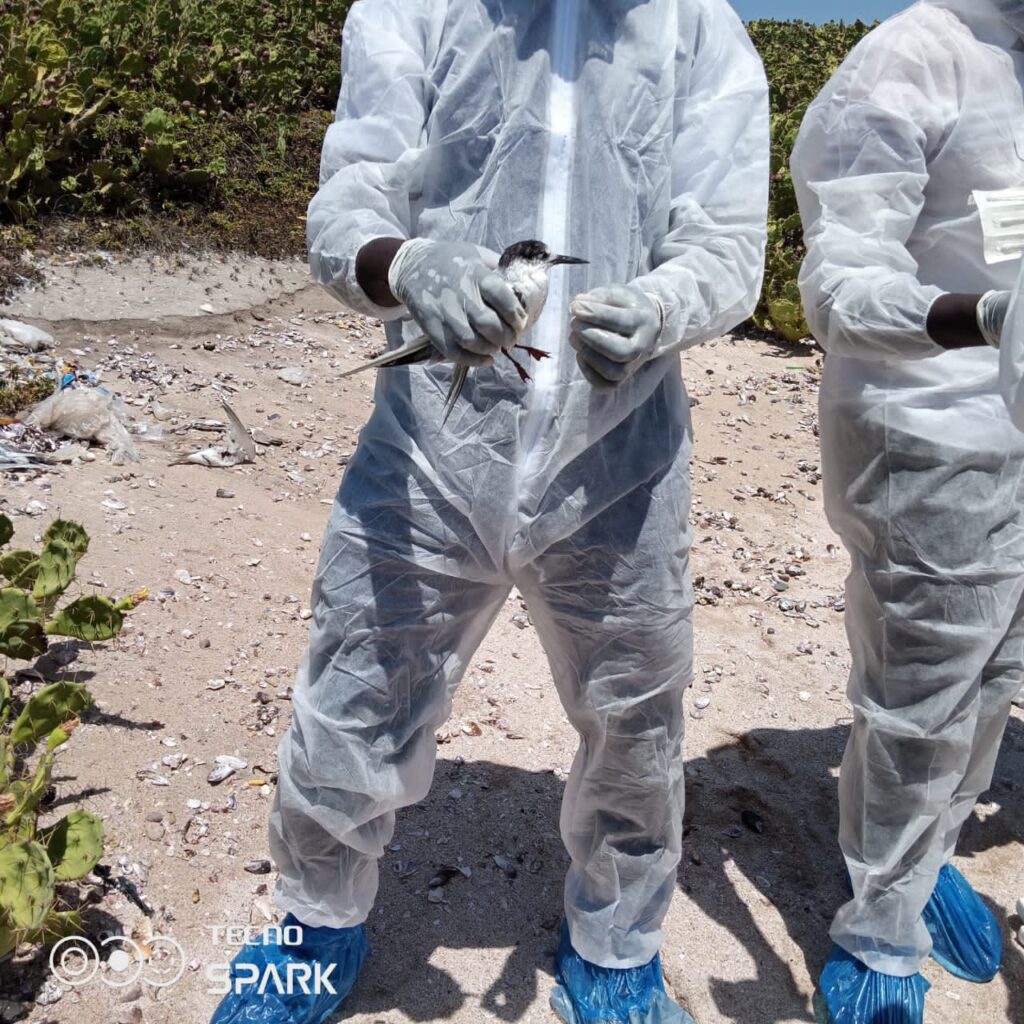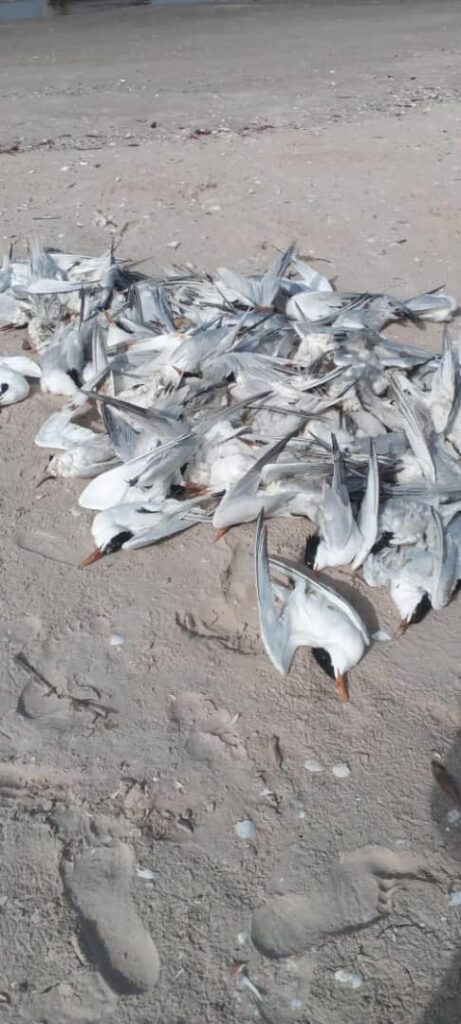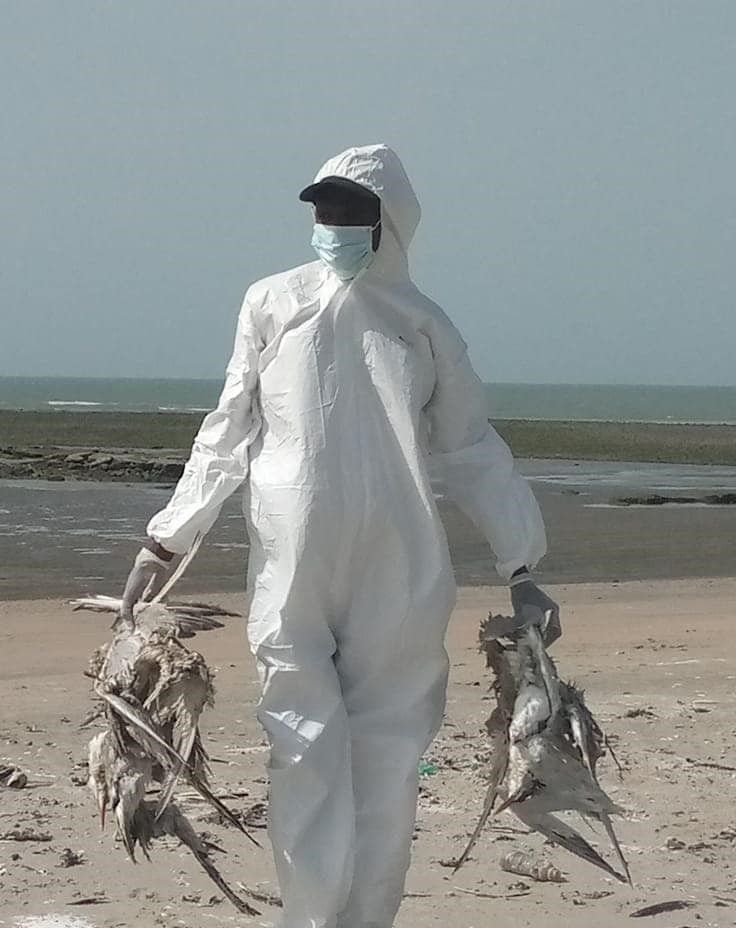Response to the outbreak of avian flu in Senegal, Gambia, and Guinea‑Bissau

BirdLife Africa is very concerned about the avian flu that is decimating thousands of birds along the coast of Senegal, Gambia, and Guinea‑Bissau.
By Cheikh Bamba Ndao
Around the world, High Pathogenic avian influenza (H5N1) is causing mass mortality in wild birds. The outbreak which began in 2021 is the worst avian influenza epidemic in history. The disease caused by a virus that has evolved in poultry farming, spreads via bird droppings, water, and direct contact. The current virus appears to have adapted to wild birds. As a result, waterbirds and seabirds have been particularly badly hit, in addition to birds of prey and scavengers.
Since March 2023, thousands of birds have been reported dead off the coasts of Senegal, Gambia, and Guinea-Bissau. According to local authorities, these deaths have been attributed to the outbreak of avian influenza in the region.

In Senegal, the outbreak has killed more than 600 Royal & Caspian terns (Thalasseus maxima) and Grey-headed Gulls (Larus cirrocephalus) in the Langue de Barbarie (northern region of Senegal), 200 in Lac Rose and about 100 in Yoff Island (Dakar region) and in the south region of the country (in Casamance specially in Kalissaye) the situation is alarming with 92 dead birds, most of which are Royal and Caspian terns according to analyses by the laboratory of the Regional Research Centre for Ecotoxicology and Environmental Safety (CERES LOCUSTOX).
Two years ago, this paradise for migratory birds made the headlines in Senegal as a result of an outbreak of the avian flu. “This January 23, 2021, following a patrol by the agents of the Djoudj National Bird Park, it was found that 750 white pelicans died, including 740 young and 10 adults” announced a statement received from the Communication Department of the Ministry of Environment and Sustainable Development at the time.
Aliou Ba, Executive Director of the Nature Communauté et Développement (NCD), and BirdLife Partner said, “It is deplorable to witness such a disaster happening again. NCD, emphasizes the importance of implementing the monitoring plan of the avian flu in Senegal.”
In Bantambur in neighbouring Guinea-Bissau, the figures are more alarming, including 1071 Royal Terns (Thalasseus maxima) , 44 Caspian Tern (Hydroprogne Caspia), One Common Tern (Stern hirundo) , One Grey-headed Gull (Larus cirrocephalus) , Two Slender-billed Gull (Chroicocephalus genei), One Great Cormorant (Phalocrocorax carbo), and One Hooded Vulture (Necrosyrte munachus)

In Gambia’s Bijol Islands, part of the Tanji River Karinti Bird Sanctuary, several birds have been affected in two offshore islands, home to many migratory bird species. According to an April 15th national situation report since the confirmation of H5N1 outbreak, 6945 had died in the country. Since the outbreak West African Bird Study Association (WABSA) has been working with Department of Parks & Wildlife Management (DPWM) to monitor Importance Bird Areas in coastal areas supported by Conservation without Borders and DPWM. The team conducted a monitoring and filming for awareness creation in the island. 107 birds were found dead in the island and the team buried all the death birds, with two royal terns found (with ring number 7177574 museum SC NAT 1000 Brussels) and (ring number 1380142 Vogeltrek stations ARN HEM Holland).
“BirdLife reaffirms its commitment to its strategic partners, namely NCD in Senegal, ODZH in Guinea-Bissau and WABSA in The Gambia, to find together the necessary ways and means to monitor and raise awareness of the population on this high pathogenic avian influenza and what to do in face of wild birds’ death. The bird protection efforts we have been making for years in West Africa are already paying a heavy price for this outbreak”, noted Geoffroy Citegeste East Atlantic Flyway Initiative (EAFI) Manager for BirdLife International in Africa.

BirdLife’s Response
BirdLife partners along the East Atlantic Flyway have been activated their local community network to monitor and alert the authority on the deaths of wilds birds in and out of the Important Birds and Biodiversity Areas (IBAs).
BirdLife in partnership with Wetlands International, le Partenariat Régional pour la Conservation de la zone côtière et Marine (PRCM) and Wadden Sea Flyway Initiative, we are supporting the country to monitor the breeding colonial birds in Mauritania, Senegal and Guinea Bissau through the Coastal Waterbirds and Wetlands Action Plan (PAZHOC). This project covers these three countries which are home to vital coastal wetlands for migratory birds as well as local breeding colonies of birds in mangroves and islands. A coordinated colonial breeding birds is planned for mid-May 2023 in the three countries.
BirdLife Africa is also calling on the Senegalese, Mauritanian, Gambian and Guinean Bissau governments to strengthen control measures including the avian flu emergency plan, monitoring protected areas, and taking measures to stop spread of the virus to poultry farms located near wetlands.
BirdLife and partners are monitoring the virus in birds and the environment, as there is need to understand which species are affected and the conservation impacts on them. Testing birds that are found dead is essential, not only to understand the effects on their population and reproduction, but also to rule out other causes of mass mortality such as botulism and storms at sea. Further, there is also need to better understand how the virus spreads and evolves as current monitoring is largely focussed on detection of the virus to assess the risk of it spreading to poultry farms, with this type of monitoring not suited for protection of wild birds populations.
Header image: Survey mission of the terns caugek and Royal found dead in the vicinity of the island of Yoff, Dakar. © Directorate of Veterinary Services and DPN.

“BirdLife reaffirms its commitment to its strategic partners, namely NCD in Senegal, ODZH in Guinea-Bissau and WABSA in The Gambia, to find together the necessary ways and means to monitor and raise awareness of the population on this high pathogenic avian influenza and what to do in face of wild birds’ deaths.”
Geoffroy Citegeste – East Atlantic Flyway Initiative (EAFI) Manager for BirdLife International in Africa.

“It is deplorable to witness such a disaster happening again. NCD, emphasizes the importance of implementing the monitoring plan of the avian flu in Senegal.”
Aliou Ba, Executive Director of the Nature Communauté et Développement (NCD), and BirdLife Partner